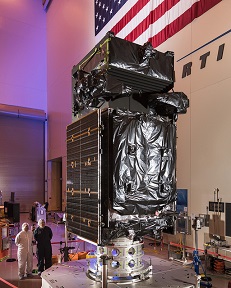Releases
BUCKLEY AIR FORCE BASE, Colo., Dec. 6, 2016 /PRNewswire/ -- Lockheed Martin's (NYSE: LMT) newly upgraded Space Based Infrared System (SBIRS) ground system received sign-off from the U.S. Air Force, enhancing the constellation's ability to deliver infrared data that is critical to early missile warning and defense.
The new SBIRS ground system serves as the nerve center for the constellation, collecting large amounts of data from the satellite's powerful sensors and converting it into actionable reports for defense, intelligence and civil applications. The Block 10 system includes upgrades like faster collection times, improved threat detections and improved target tracking and infrared information to see dimmer events faster.
Operational Acceptance of the SBIRS ground system consolidates the Air Force's command and control of legacy Defense Support Program satellites, SBIRS geosynchronous Earth orbit satellites and highly elliptical orbit payloads into the same ground system. SBIRS Block 10 also improves cueing data for missile defense systems and allows for command, control and mission planning of taskable sensors, as well as real-time and offline raw sensor data processing for technical intelligence used by the intelligence community.
"While launching a satellite is a highly momentous event, the work continues 24/7 on the ground within command and data processing centers," said David Sheridan, vice president of Lockheed Martin's Overhead Persistent Infrared Systems mission area. "With the Block 10 upgrade, the mission-critical data supplied by SBIRS is now being managed from a single ground control station, which is not only cost-efficient, but also more effective in providing our Air Force operators with the ability to characterize threats and quickly provide that information to military commanders deployed around the globe."
Already, the multi-mission system supports missile warning, missile defense, battlespace awareness, and technical intelligence and also distributes raw and processed data in order to support civil and emerging applications. With the deployment of the ground system, Lockheed Martin will provide ongoing operations and sustainment support, while continuing to enhance the system through additional cyber security capabilities, automation features and continued evolutions to support Air Force requirements.
The new ground system is located at the SBIRS Mission Control Station at Buckley Air Force Base, Colorado, and replaces the existing ground segment, which has been in operation since 2001.
The SBIRS development team is led by the Remote Sensing Systems Directorate at the U.S. Air Force Space and Missile Systems Center, Los Angeles Air Force Base, California. Lockheed Martin Space Systems, Sunnyvale, California, is the SBIRS prime contractor, with Northrop Grumman Aerospace Systems, Azusa, California, as the payload integrator. The 460th Space Wing, Buckley Air Force Base, Colorado, operates the SBIRS system.
For more information about SBIRS, visit: www.lockheedmartin.com/sbirs.
About Lockheed Martin
Headquartered in Bethesda, Maryland, Lockheed Martin is a global security and aerospace company that employs approximately 98,000 people worldwide and is principally engaged in the research, design, development, manufacture, integration and sustainment of advanced technology systems, products and services.
SOURCE Lockheed Martin


